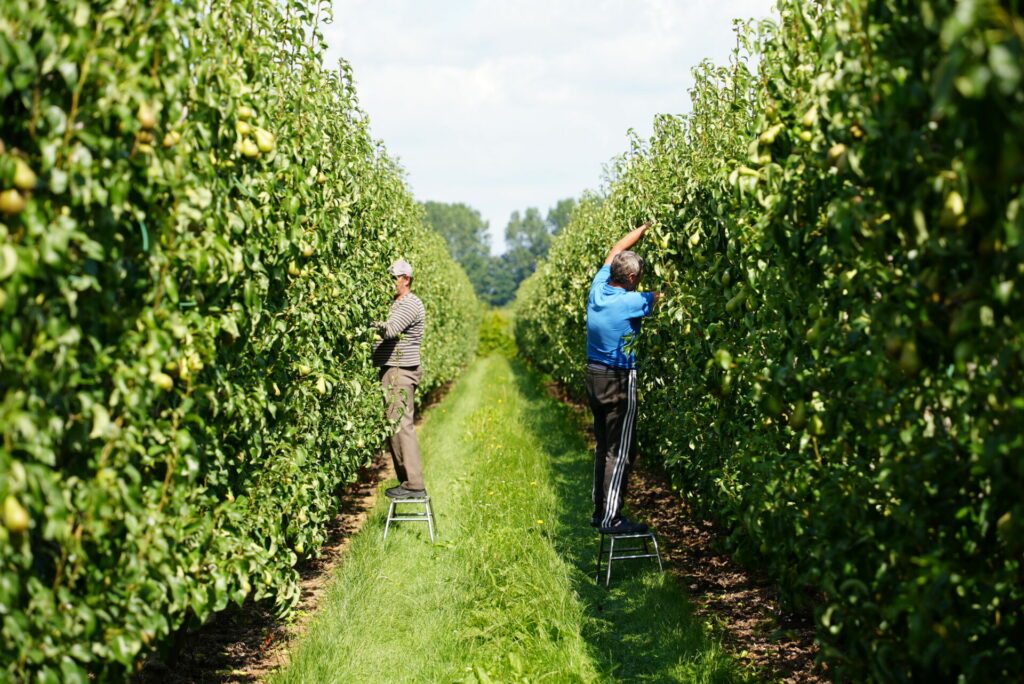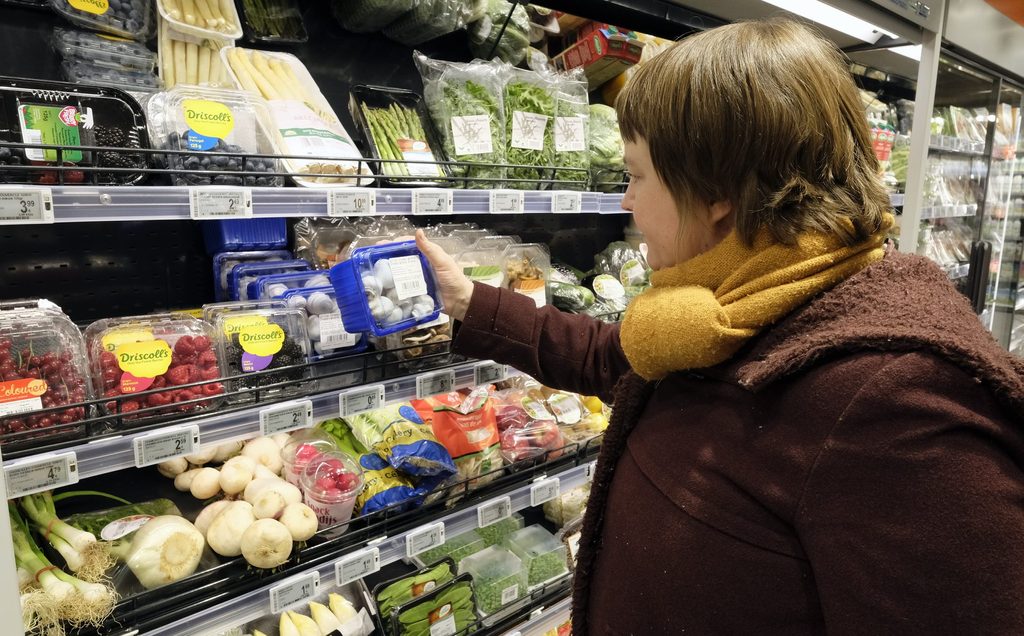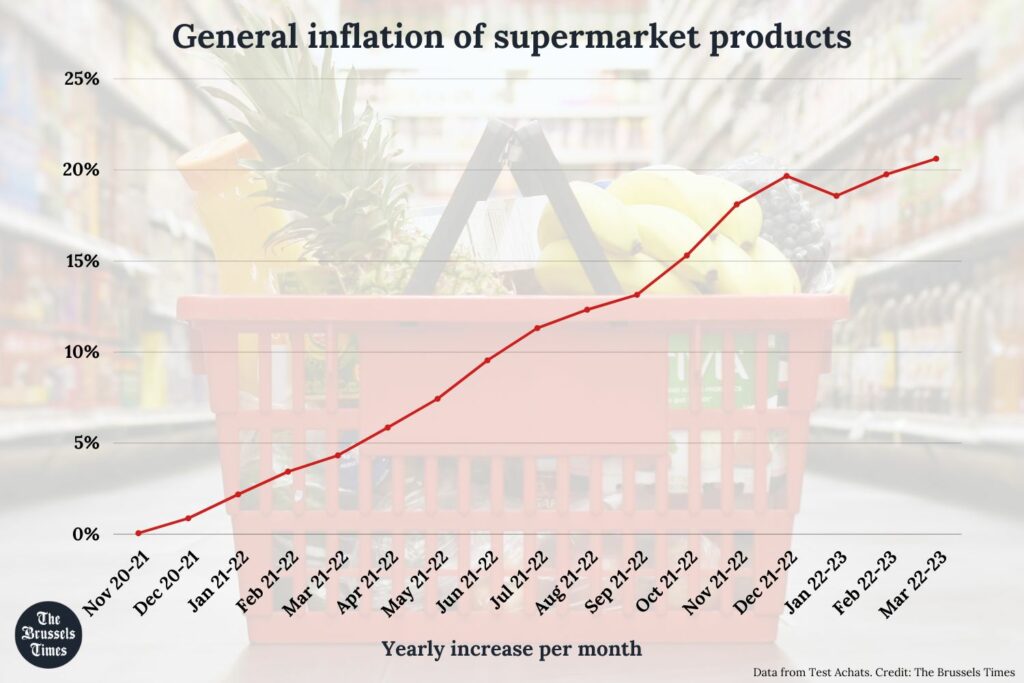Food markets across Europe have been destabilised since supply chains were disrupted by Russia's assault on Ukraine and the subsequent energy crisis caused prices to flare up.
In Belgium this led to sharp increases in the cost of some products, with year-on-year inflation breaking national records in March to reach 20.6%. This meant that families paid one-fifth more for the same groceries during this month – an average rise of €89 to feed a two-person household.
Among the products most affected were fresh vegetables, especially those that are more energy-intensive to grow or are produced further away. Dairy products also became vastly more expensive, in some cases 30-40% more in one year.
Yet whilst some speciality products or those of premium brands made headlines for major leaps (mustard became exceptionally dear), many in Belgium were hit with the rise in costs for common staples: bread and pasta costs rose dramatically, impacting household budgets and stomachs.
Whilst inflation for food itself is difficult to suppress since it varies largely according to input costs during the production process, numerous attempts were made either to disguise it or worse, to capitalise from it.
In the former case, many producers turned to tactics of "shrinkflation", whereby the quantity of foodstuff contained within a packet was slightly reduced whilst the price remained the same. This would make consumers less likely to notice the inflated cost of products.
Worse still has been "greedflation" – a phenomenon by which producers deliberately keep prices higher, expecting that consumers mistake it for real inflation. Whilst prices might first have increased due to rising production costs, these were subsiding towards the end of 2022.
Consumer associations argued that there was little change in supermarket prices despite falling prices on international wholesale markets.

Seasonal workers harvesting pears in Belgium. The cost of many fruits has fallen dramatically over the past year. Credit: Belga / Jonas D'Hollander
Though some producers denied wrongdoing and said they were only passing costs on to buyers, the unreasonably high prices were widely acknowledged and triggered political action to help consumers tackle the swell in grocery costs.
It now seems that the efforts might finally be having the desired effect, with food prices falling by an average of 2.3% from August to September. To explain the drop, Pierre-Alexandre Billiet told De Morgen, that "Some powerful producers really did exaggerate."
Billiet is head of Gondola Group, the leading platform for professionals in the consumer goods business which make up over 52% of the Belgian GDP. He explains that the international decline in commodity prices made some of the inflated prices untenable. Producers that have tried to keep prices high have subsequently faced scrutiny.
Cheating consumers
"Some food multinationals have increased their prices way too much and now have to cave in under political pressure," says Billiet. "When an economy minister (Pierre-Yves Dermagne, PS) threatens to disclose the names of the brands involved, it does have an impact."
One such company that tried to charge consumers more is the multinational Mondelez, which owns confectionary brands Milka, Côte d'Or, Toblerone, and Cadbury, among others. Retailers argue that it raised its chocolate price too much. Billiet agrees: "In some sectors, there really was an exaggeration."
With pressure rising, the company has now greatly reduced the price of its chocolate, with a sudden reduction of 17.7% in September. This sharp drop is more than just the result of lower cocoa prices.
Elsewhere, Belgians now pay less for fresh fruit (5.1% cheaper), vegetables (-4.6%), and bakery products and cereals (-3.6 %). Confectionary became 10.9% cheaper.
Related News
- Belgium posts second-lowest inflation rate in eurozone
- 'Complete breakdown of responsibility': CEOs accused of 'asset-stripping' EU economy
- Food prices in Belgium remain high, but trend is 'in line with neighbouring countries'
Billiet also highlights the effect of competition in Belgian supermarkets. "When Albert Heijn dropped some prices Colruyt reacted immediately... no supermarket wants to lose its edge."
In particular, retailers have been making significant gains in their home brands. Last week, consumer organisation Test Achats calculated that shoppers can save up to 62% by choosing house brands at Aldi and Lidl instead of premium brands at other stores. Billiet concurs, explaining that retailers have more control over their own brands and have greater bargaining power with the manufacturer.
However, too sharp a drop in prices could have undesired consequences, most notably to quality. Billiet cautions that after inflation, a race to the bottom could have a major impact on public health: "We might pay little at the supermarket checkout, but a lot at the doctor's. Retailers and brands must ask themselves the social cost of low prices."


